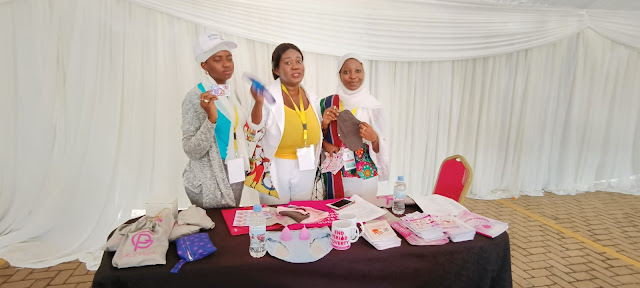Ladies without plastic+ Fashion and Art in defence of the environment
Fashion and Art in defense of the environment
Ladies and Gentlemen.
Welcome everyone to our Startup Talentos Multiplus. My name is Sofonie Dala, I'm the founder of this non-profit digital startup that creates awareness on the sustainable development goals (SDGs).
Today we are here to talk about one of our most successful projects "Ladies without Plastic".
What is "Ladies Without Plastic"?
"Ladies Without Plastic" is a reusable menstrual pad made of cotton and cloth that aims to mobilize women to change plastic pads that pollute the environment causing climate change. We strongly recommend women to start using our reusable sanitary pads, which do not pollute the environment but reduce the pollution and is also much more cost effective..
This project aims to help reduce the high levels of unemployment in our country, by producing reusable products on a large scale so that more women can have access to these products, and together we can end the period of poverty. We seek to create partnerships with governments, private organizations and other institutions in order to receive financial support.
Through our projects we fight against climate change and environmental pollution, empowering, mobilizing and with non-formal sustainable development training.
This business model, in addition to being educational, also has a very beautiful fashion style. This style intrigues women and makes them very thoughtful. By reading Ladies Without Plastics, they will be learning that plastics pollute the environment.
In 2022 we won the third place in the Young Innovator Award competition. We were happy with the prize of a 1000.000, 00 Angolan kwanzas, which helped us to buy at least one sewing machine. Unfortunately, it was not enough for us to reach all project goals.
The project needs more support and sponsorships to move up to the next stage which is the implementation and expansion of the project. We have at the top of our agenda the recruitment of some girls and women, since this project not only aims to reduce environmental pollution but also to reduce poverty and unemployment among girls and women.
.jpg)
Therefore, we need more financial resources to support those women and girls who will be producing these menstrual pads. We will also be offering capacity building trainings to equip them with the skills needed for them to get ahead and not be totally dependent on the company. These trainings will help them produce and distribute pads in their communities and neighborhoods that will allow them to generate income for themselves.
We also continue organizing community campaigns to make people aware of the importance of achieving the 17 sustainable goals of the United Nations.
For this project we have already bought a machine, but we have not been able to buy other necessary equipment to continue our project.
These plastic pads that are sold in supermarkets are very expensive and not every woman has the possibility to buy them. It has been a great challenge for a poor mothers with many daughters.
As a solution, we developed Ladies Without Plastic menstrual pad, which is more durable and cheaper. Some women will be able to resell and earn their income.
Industries should contribute by making products more durable and costing fewer low-impact materials. Manufacturers could also opt for less resource-intensive production and transportation methods.
"Zero-waste initiatives can foster sound waste management and minimise and prevent waste, helping to address the triple planetary crisis, protect the environment, enhance food security and improve human health and well-being," the UN note outlines.
We support the SDG4 - quality education and will be keeping offering capacity building training to equip young women with skills to face climate change, especially those living in the most affected areas.
INTERVIEW
Hello!
Hello.
How are you?
I am fine. And you?
Great!
What is your name?
Edvania.
Pleasure to meet you.
Edvania, what do you have in your hands?
I have 2 types of sanitary pads.
Do you always use these pads?
Yes.
Which one do you use the most?
I always use the plastic sanitary pad, but the cloth one I've used a few times.
How have you been using them?
Well, the cloth one is reusable, I can use it several times, but the plastic one is disposable, it is used only once.
What was your experience with the cloth pad?
It has been more economical for me, but the plastic one you always will need money to buy it.
Sustainable music
Let's use the reusable one, plastic-free ladies
Let's use the reusable one, plastic-free girls
Protect the environment, limit pollution,
Let's use the reusable pad, ladies without plastic!
We, as startups, will start promoting environmental awareness campaigns even more strongly in order to educate and help people reduce their carbon footprint on the environment.
Learn more about our work
.jpg)



%20(1).jpg)
.jpg)



.jpg)








Comments
Post a Comment